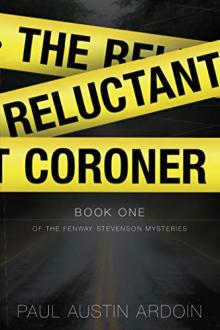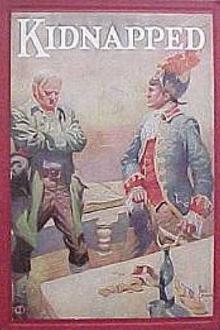The Reluctant Coroner by Paul Austin Ardoin (best ebook reader ubuntu txt) 📕

- Author: Paul Austin Ardoin
- Performer: -
Book online «The Reluctant Coroner by Paul Austin Ardoin (best ebook reader ubuntu txt) 📕». Author Paul Austin Ardoin
A few bicyclists in brightly colored, skintight outfits passed her, headed away from the main road. They went past the Not a Through Street sign. Where were they going?
In five minutes, she was in line at the Coffee Bean. Only three people ahead of her. On a Tuesday morning at the beginning of the commute in Seattle, the line would have been out the door.
“Large latte,” she said to the cashier.
“Sure thing,” the cashier chirped, and Fenway almost jumped back with the force of the unexpected enthusiasm. “Can I get your name?”
“Joanne.”
“Thanks, Joanne. That’ll be right up. You have a great day, okay?”
Fenway blinked. “Sure. Yeah. You too.”
Fenway settled in an overstuffed chair next to a tiny round table, staring into space. The barista had to call Joanne twice.
As she went to get her latte, she wondered when she could get started on her life. When could she get her furniture out of the truck? When could she start interviewing for those jobs her father promised?
Everything was dependent on him. She took a drink and sat back heavily in the chair. Accepting her father’s offer had seemed logical at the time, as she barely had enough money to get through the next few weeks. Now it seemed like a bad decision. Surely she could have slept on a friend’s couch in Seattle. Or maybe even stayed with an ex-boyfriend. Just until she got on her feet.
A couple of phone calls and another two days in the rental truck and she could undo this decision. She sipped her latte as two women in their late thirties, dressed in matching yoga pants, crossed in front of her.
“He promised me he’d take Ethan to his game today.”
“But you have to come to Pilates. I’ll die if you’re not there.”
“When I woke up, he’d already left for the golf course. And Ethan already missed practice on Thursday.”
She’d never been a huge fan of people-watching, but this was like a cultural anthropology lesson. Compared to the bustle and diversity of downtown Seattle, Estancia was a foreign country. Another pair of white women, both in dark jeans and North Face jackets, waited for their coffee orders to Fenway’s right.
“I know he said not to get another area rug, but it was on sale.”
“And it’s gorgeous. Does he not see how gorgeous it is?”
“I know. Honestly, it pulls the whole room together…”
White people in their native habitat. The voice in her head sounded like Richard Attenborough.
Then two more female voices behind her. “Are you still worried about Allan getting laid off?”
“He hasn’t heard anything for sure, but I hate the rumors I’m hearing. Ferris Energy has still got the whole area closed for the accident investigation. Can you believe it? What’s Allan going to do?”
“Better unemployed than dead, Angie.”
Fenway’s ears pricked up.
Nathaniel Ferris had always been the most powerful man in the county. His eponymous energy company was the largest employer, and even when oil prices fluctuated wildly, he still made his numbers, got his bonuses, made his slice of the profits.
Than dead?
Had something happened? Something to ruffle her father’s unrufflable feathers? Could her rich, powerful, perfect father be at fault for an accident at his refinery? She didn’t remember anything from the news, but she was a thousand miles away—and didn’t pay attention to any news about her father, anyway.
But this was interesting.
“I think you’re making too big of a deal out of it,” Angie’s friend said. “They did an internal investigation. Wrong place, wrong time. Allan shouldn’t get laid off just because his co-workers did something stupid.”
Wrong place, wrong time? Fenway leaned back, but the barista called Angie and then the two women were out of earshot.
Fenway tried to shift her attention to other conversations, but she couldn’t concentrate.
Better unemployed than dead.
Wrong place, wrong time.
What had happened at the refinery? Perhaps the internet would have answers. Fenway reached in her pocket for her phone—but it was still charging in the bedroom.
So she left the coffee shop, her latte still half full, her curiosity bubbling out of her head.
Then another bicyclist passed her, straight down the side road, past the Not a Through Street sign.
Fenway stopped in her tracks and took another sip.
Okay—if she was going to find out what happened at her father’s refinery, she could get the information slowly on her tiny screen or she could wait to set up her computer.
And if she was going to follow those bicyclists, she should do it before anyone arrived to help move the furniture.
Fenway walked toward the complex, then past it. The road didn’t fan out into a cul-de-sac like she thought it might; it was a true dead end, with a wooden fence the width of the road, made out of four-by-four posts and wide planks painted white. Red and yellow reflectors were spaced several feet apart on each of the planks. To the right of the fence, a dirt path led off into the trees, showing fresh marks from bicycle tires.
She walked to the fence and gazed as far as she could up the path. About thirty feet farther up, it turned, revealing nothing of what might lie beyond. She threw her latte cup in the trash can next to the fence and started up the path.
After a few minutes, she passed a grove of trees and found herself hiking through a small clearing. The mist was thick here, and the branches of the trees made a canopy, keeping the thick, soupy fog at bay. On the other side of the clearing, Fenway made her way through another patch of trees. She passed a brown metal sign identifying the grove as a monarch butterfly waystation. She squinted at the upper branches through the fog. No butterflies up there today, though. Farther on, white starbursts of milkweed bloomed on each side of the patch. After a second grove—another ten minutes of walking—the trees ended abruptly.
Fenway stood at the edge of a flat, grassy plain, the misty sky uninterrupted in front of her. It was easily fifty feet from the edge of the trees to the end of the grass. There was no path through the grass, which was long but lay flat. She had to step high to walk through it.
There was a short drop-off, maybe three feet or so, to a sandy beach, and about a hundred yards farther out, the Pacific.
Fenway walked to the edge of the drop-off and stopped.
Something felt odd: she hadn’t been in this spot before—not that she could remember, anyway—and yet everything was familiar: the cypress tree, windblown into its odd shape, coming out of the rock formation; the drop-off, a barstool-height drop onto ground covered with sand, shrubs, and dirt. Even the black spots on the sand, oil clumping like cat litter, waste from the offshore drilling her father was mostly responsible for.
Why did she know this place?
She closed her eyes. Insects clicked in the trees behind her, waves crashed on the shore. Ravens cawed, arguing with each other, arguing with the wind.
It felt so close. She almost had it.
She opened her eyes and looked up and down the beach. Maybe the view from the shore would jog her memory. For the next half hour, Fenway walked the beach. The frigid air and the roar of the waves kept her mind off her impending job search and her father’s two decades of broken promises. But nothing else looked familiar. Still, the sight of the cypress tree growing out of the rocks burned in her brain. She knew she’d seen it before.
Fenway retraced her steps to the complex, feeling better than she had since her mother’s diagnosis. Maybe even before that.
She arrived at her new apartment at seven forty-five and saw a white policeman at her door—and immediately her heart raced.
Oh—this was probably the sheriff who’d been looking for her the previous night.
He wore a black uniform with a black belt and boots. It wasn’t yet eight o’clock, and there was hesitation in his body language as he raised his hand to knock.
“Can I help you?” she asked.
He flinched slightly but regained his composure as he turned to her. “Hi there. I’m looking for Fenway Stevenson.”
She blinked.
His skin was pale, with a smattering of freckles on his nose and cheeks. Trim but muscular, he was a good three or four inches taller than Fenway’s five-ten, and his neatly pressed short-sleeved uniform shirt showed off some healthy biceps. At first glance, he looked to be in his thirties, but the lines around his blue eyes suggested a few more years of experience.
Fenway was suddenly aware of her workout clothes and the sweat she’d worked up





Comments (0)